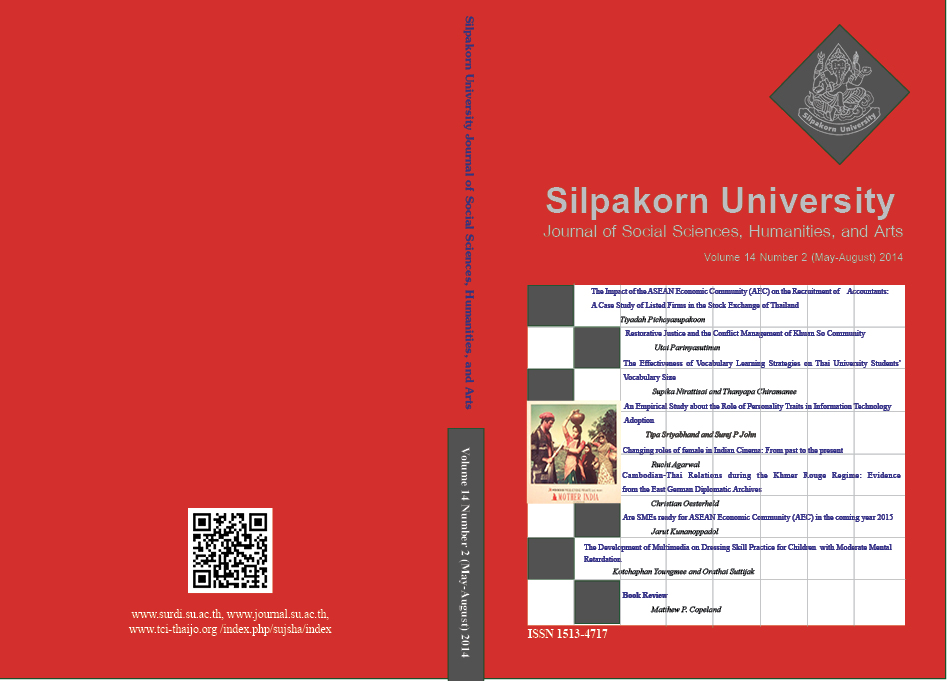The Impact of the ASEAN Economic Community (AEC) on the Recruitment of Accountants: A Case Study of Listed Firms on the Stock Exchange of Thailand
Main Article Content
Abstract
This research aims to analyze the essence of the Mutual Recognition Agreement (MRA) in the field of accounting profession in ASEAN Economic Community (AEC) that impacts the accounting profession in Thailand and to survey the knowledge and understanding of public listed firms on the agreement, as well as their attitude toward workforce mobility among countries in the AEC and the accountant’s qualification before and after the AEC. The analysis is based on relevant documents, questionnaire and interviewing the director of accounting in companies listed on the Stock Exchange of Thailand. Overall, the research results show that most of the samples have knowledge and understanding of MRA. in the field of accounting profession at low level. The attitude toward workforce mobility is positively oriented, and strongly agree with the workforce mobility in the accounting profession. Accounting professionals must prepare on the following issues, working experience, training or workshop of potential development, English language skill in efficiency level. In addition, educational institutions should develop programs to be compatible for stepping into AEC. The requirements of accountant qualifications from the perspective of Thai Listed Firms in the Stock Exchange are as of following: complete Bachelor’s Degree, know Thai accounting standards, reportingstandards, English language skill.
Downloads
Article Details
All rights reserved. Apart from citations for the purposes of research, private study, or criticism and review,no part of this publication may be reproduced, stored or transmitted in any other form without prior written permission by the publisher.
References
Chaiya, N. (2008) Thailand’s Opportunities and Challenges Toward EU-ASEAN FTA. Bangkok. A Thesis for the Degree of Master of Arts Program in European, Chulalongkorn University.
Charoenphon, V., Kanchanapinyokul, E., and Jongsaliswang, M. (2011) How will Thai Businesses Proceed in AEC? [Online URL: https://www.scbeic.com/stocks/extra/1954_20110211132802.pdf] accessed on April 18, 2012.
Charoensuk, P. and Charoensuk, J. (2011) English and Thailand’s Economy for ASEAN Economic Community (AEC) 2015. Executive Journal Bangkok University 31(4): 34-40.
Department Of Business Development Ministry of Commerce. (2012) Regulated Accounting Profession Act (6) Accountant the Accounting Act B.E. 2547.
Geawgirdsee, S. (2006) Impacts of The Association of Southeast Nations Free Trade Area (AFTA) on Labor Utilization in the Footwear Industry: Are Laborers Becoming Shoes makers or Wage Earners in Footwear Manufacturers. A Thesis for the Degree of Master of Arts Faculty of Social Administration Thammasat University.
Government Gazette. (2004) Volume121 Special part 65 Kor, page 1-21.
Inrak, C., Phuangrod, S., and Wongrontha, A. (2006). Public and Private Cooperation in Labor Development of Southern Provinces for Serving AFTA Development Institute of Southeast Asia Maritime State Study, Prince of Songkla University, Pattani SONGKLANAKARIN Journal of Social Sciences & Humanities 12(4): 561-576.
Kaewphap, K. (2012) The Readiness to ASEAN Economic Community of Accounting Students from Bangkok University, A Tutorial Review. Proceedings of Annual Conference in 2012: Bangkok University, pp. 663-673.
Nakpibal, M. (2007) The Guideline To Interpret Labor Chapter In Free Trade Agreement: A study on Us –Chile Free Trade Agreement Bangkok. A Thesis for the Degree of Master of Laws Program in Laws, Faculty of Law Chulalongkorn University.
Pangleelart, N. (2012) Workforce Mobility into ASEAN: Opportunities and Impacts on Thailand. [Online URL: www.itd.or.th/articles?download] accessed on March 28, 2012.
Panyamit, S. (2005) The Impact of FTA in the Attitude of Logistics. A Thesis for the Degree of Master of Science, Graduate School of Management and innovation, King Mongkut's University of Technology Thonburi.
Phoompanich, W. (1999) The Certified Public Accountants Thailand should have?. [Online URL: www.journal.au.edu/abac_newsletter/1999/sep99/accountant.html] accessed on April 18, 2010.
Prateepvanich, S. (2013) Preparation of Thai Fashion Business for the Participation in ASEAN Economics Community. Executive Journal Bangkok University, 33(1): 45-54.
Saetae, T., Wongnak, N., and Chaiprasit, S. (2010) In Line with AFTA, Creating Social Innovation in Thailand through Improving Educational System. Executive Journal Bangkok University 30(4): 146-149.
Sngounsiritham, U. (2012) The Effect of Implementation of the ASEAN Economic Community in 2015. Journal of nursing science Chulalongkorn University on Thai Nurse 24(1):1-9.
Soipet, S. (2012) Thailand’s Policy toward East Asian Economic Integration. International Trade Forum 2(1): 26-27.
Sutantivanichkul, N. (2011) A study of technology readiness of Thai vocational institutions in ASEAN economic community. Bangkok. Dhurakit Pundit University.
Suwanpong, B. (2011) AEC: ASEAN Economic Community,Opportunities or Obstacles for Thai Businesses?. Econnews :Economic and Social Media 21(1):14-21.
Tunwasinpong, S., Thongyim, P., and Petchseechuang, W. (2011) Study Project on the Preparedness of Workforce to Facilitate the 9 Categories of Free Trade as to AEC Framework. [Online URL: https://www. home.dsd.go.th/SDP filedownload/.PPT/] accessed on April 16, 2012.
Wattanasirichaigoon, S. (2010) National Strategic Plan for Developing Thailand before entering AEC in 2015. [Online URL: https://www.elib3.ect.go.th/Multim Aped/Aped01_62.pdf] accessed on April 18, 2012.
Wattanavirai, N. and Sittipolvanichagul, J. (2012) The Potential Development of Thai Accounting Profession on Economic Liberalization. Executive Journal Bangkok University 32(3): 16-25.


